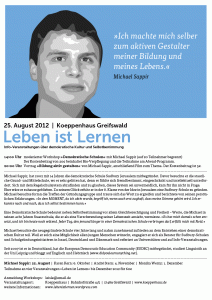(-> German translation/Deutsche Übersetzung)
I
The term “democratic school” has always seemed problematic to me. It’s problematic because democracy isn’t really the point. Democracy is a tool for creating something else: a community where free learning is possible, as much as such a community is possible. All democratic schools should be run by a democracy, but not every school that is run democratically is automatically a democratic school.
A democratic school is a place where students are responsible for how they use their own time. It is a school which does not try to encourage students, explicitly or implicitly, to take classes and tests. It is a place where people are treated with respect, and know they can expect justice to be served when someone disrespects the community or an individual.
II
It just so happens that certain styles of democracy serve as excellent tools for upholding freedom and respect. However, it’s very easy to get it wrong, which is why Sudbury schools are very insistent on getting it right. These schools set up very well-defined democracies, because democracy is only good so long as it does not overreach — it has to be there to protect students’ freedom in the present, without presuming to know what choices are better for their future, or infringing on the privacy of their feelings.
III
Incidentally, the word “republic” comes from the Latin res publica, meaning “public matter”. This hints at a very important idea: the polity (the state, the city, the school) is a public institution, and is something you keep separate from private things.
Sudbury schools use a Judicial Committee which focusses on whether school laws were broken (not on why, or what the individual is going through personally). Some in the free school movement express uneasiness about this seemingly severe approach to justice. However, anyone who has spent some time in such a school knows it is a good thing. Judicial Committee deals with the public aspect of disputes — disrespect of community decisions in such a way that bothered someone enough that they fill out a complaint. This process ignores the personal aspects completely and intentionally.
However, it leaves plenty of room for individuals to address these aspects on a truly personal level. And these are things that come across better when they’re truly and sincerely personal (like talking about problems at home, or about issues one is having with the school or with people there). The judicial process may not directly address the problems that lead people to break community decisions, but it does help others see the problem, which allows them to deal with it. And on the upside, it respects people’s privacy — sometimes you don’t feel like telling just anyone about how you feel.
IV
There are other benefits to separation of the public and the personal. When the community has accustomed itself to this habit, democratic meetings work better — being warned by the Chair is a technical issue, not a personal thing you have to get annoyed about; you can argue strongly against a friend’s motion without them taking it as an insult; every member of the community can apply their thinking to the process as much as they’d like without constantly worrying about the conclusions being taken the wrong way.
V
When a democracy protects the community’s interests and the individuals’ interests while keeping them separate, that democracy can create a democratic school. It can create a place where students develop freely and learn to direct their own learning and gauge their own success. It empowers students to determine their own direction and participate vigorously in community life.
None of these things are automatic, and protecting them is half the secret of success for those democratic schools that have succeeded.

Like this post? Flattr it!


